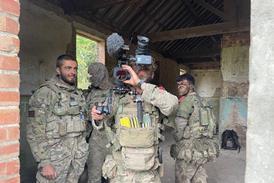By 1857, the year in which our drama-doc begins, Dickens was probably the most famous Englishman alive. Not only was he the bestselling English author of all time and a social reformer, he also more or less singlehandedly invented the Victorian ideal of happy families. Yet he had abandoned his wife and was having a torrid and desperately secret affair with Nelly Ternan, an actress young enough to be his daughter.
It changed his whole artistic outlook. Gone was the joviality of Pickwick Papers and the sentimentality of David Copperfield and in came the dark, tortured themes of the later novels. As one biographer put it “there was Dickens before Nelly Ternan and another Dickens after”. It's a powerful story to bring to the screen and an ideal fit for C4's Victorian Passions season.
Casting the presenter was the first challenge. We were looking for a presenter who could take on the role of a detective, piecing together the tale from the scraps of hard evidence that still exist. We also wanted someone slightly unexpected who'd demonstrate the passion of an amateur aficionado, rather than that of a professional Dickens expert.
Charles Dance was ideal. He has appeared in several Dickens adaptations, most memorably as Bleak House's icy and ruthless lawyer Tulkinghorn. Charles, knowing the obsessive themes in the later Dickens works of subterfuge and double lives well, was keen to be involved in unpicking this story of Dickens' own dark secrets.
Charles Dance plays detective in a film that revisits locations from this chapter in Dickens' life and talks to five Dickens experts, who are interspersed with dramatisations of key moments in the writer's life.
Within the budget for all the elements we wanted, we decided to bring our five expert interviewees to a studio and film them in one day, against interesting Victorian backdrops. We wanted to use back projection so we filmed some backgrounds in quirky period interiors and then projected them against the white infinity studio. We sat each interviewee on a Victorian chair and placed a few Victorian props behind them. The cameraman, Spike Geilinger, and I found that by tilting the projector to take the image across the studio floor and, by shooting handheld, we could avoid the static “keyed” look that back projection usually has.
For Dance's pieces to camera we hoped to take in as many different locations as possible. Without the new network of railway lines spreading out of London, Dickens' double life would not have been so easy. It allowed him to cover his tracks, travelling almost daily from his grand house near Rochester to London and on to see Nelly (hidden in a cottage in Slough).
So we made a virtue of this, filming in London stations and doing Charles Dance's pieces to camera on trains.
For the dramatisations, we decided to re-enact some of the public readings which Dickens did all over the country and to dramatise pivotal moments in his relationship with Nelly.
The biggest problem with drama-doc seems to be creating scenes that are brief but still powerful. Luckily screenwriter Jim Barton agreed to write the scenes and once we had a good script that helped us to secure good actors. As well as being the biggest celebrity of his day, Dickens was a great performer in his own right. The role required an actor of the first rank, so we were delighted to get David Haig.
Our Nelly needed to convey the beauty and innocence of the 18 year old Dickens first fell for, but also the qualities that kept him enchanted for the rest of his life. Amy Shiels, a stunning Irish actress, was perfect for the part.
To get as much value as possible from our two drama filming days we kept all the action to two locations. On the first day we filmed everything at the Theatre Royal in Margate, the oldest un-restored Victorian theatre in the country. Dickens was obsessed with theatre, which is how he met Nelly, acting in a charity performance.
For the second day we needed an authentic Victorian drawing room. I was walking home when I looked up at my neighbour's living room. Mrs Messim has a drawing room filled with wonderful Victorian furniture which we were able to transform into Nelly and Dickens' love nest and then restore it back without a hitch.
Well, there was one hitch. Her favourite Greek channels on the satellite box somehow went AWOL and I have made the usual extravagant promises of parachuting in a technical expert immediately. So if anybody knows anyone able to help...
Dickens' Secret Lover is a Flame TV production for C4. Its airs on Monday 23 June at 9pm
Sarah Aspinall: My tricks of the trade
Get good actors, even for minimal dramatisations.
For any drama shooting, budget for a good first AD - they will save time and money in
the end.
I always take a notebook with a list of the things I might forget in the heat of the moment, and tick them off as the day goes on.
For period drama get a proper hair and make-up designer: bad whiskers look worse than anything.
Be as ambitious casting and writing dramatised sequences as you would for a full drama. Poor acting or dialogue can make a drama-doc painful to watch.

























No comments yet